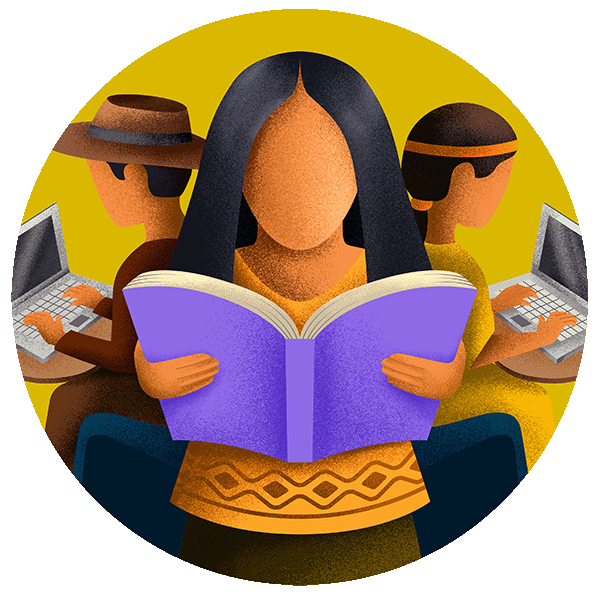
Edson Krenak Advocates For The Rights Of Indigenous Peoples In Brazil At COP26
Cultural Survival’s Lead on Brazil, Edson Krenak of the Krenak Peoples was at COP26, joining Indigenous delegations in making sure Indigenous voices are heard and listened to in the fight to combat climate change.
Produced by Avexnim Cojti (Maya Ki'che) and Shaldon Ferris (Khoisan)
Soundclip: Edson Krenak at COP26
Image: Edson Krenak
Music: "Anania2" by The Baba Project, used with permission
Indigenous Knowledge Is Fundamental To The Preservation Of Humanity - Frank Ettawageshik At COP26
At this year's United Nations Framework Convention on Climate Change (UNFCCC) Conference of Parties (COP 26) in Glasgow, Scotland, Cultural Survival spoke with Frank Ettawageshik (Little Traverse Bay Bands of Odawa Indians), Executive Director of the United Tribes of Michigan and President of Association on American Indian Affairs, who has been involved in international Indigenous rights advocacy for decades, about Indigenous leadership in climate action.
Cultural Survival At COP26 - An Interview With Fawn Sharp
The COP26 summit will bring parties together to accelerate action towards the goals of the Paris Agreement and the UN Framework Convention on Climate Change.
How is climate change affecting Indigenous Peoples?
Cultural Survival's Avexnim Cojti spoke to Fawn Sharp, President of the National Congress of American Indians (NCAI)
Produced by Avexnim Cojti (Maya Ki'che) and Shaldon Ferris (Khoisan)
Interviewee: Fawn Sharp (Quinault Indian Nation)
Music: 'Whispers' by Ziibiwan, used with permission
International Day of The Worlds Indigenous Peoples - Leave No One Behind
There are over 476 million Indigenous Peoples living in 90 countries across the world, accounting for 6.2 percent of the global population. Indigenous Peoples are the holders of a vast diversity of unique cultures, traditions, languages, and knowledge systems. They have a special relationship with their lands and hold diverse concepts of development based on their own worldviews and priorities.
In this radio program, we hear from Nailejileji Tipap, who works as the Gender and Public Relations Coordinator at Pastoralists Indigenous NGOs Forum in Tanzania.
Finding Balance - An Interview with Jannie Staffansson
Women of the world want and deserve an equal future free from stigma, stereotypes and violence; a future that’s sustainable, peaceful, with equal rights and opportunities for all. To get us there, women need to be at every table where decisions are made. In this podcast, we speak to Jannie Staffansson (Saami), a renowned Indigenous climate change expert and a Cultural Survival board member. Staffansson tells us about balancing traditional lifeways today.
Produced by Shaldon Ferris
Communication is Crucial - World Radio Day 2021
UNESCO calls on radio stations to celebrate World Radio Day's 10th anniversary and the more than 110 years of radio. Cultural Survival's Indigenous Rights Radio supported the Khwe people from the Okavango region in starting Khwedam Radio – a radio station that will assist the Khwe and !Xun speaking San Peoples to be able to communicate better with each other in remote regions of Namibia.
Rooibos Tea - South Africa's Indigenous Peoples Reclaim Their Birthright
Humanity NPC travelled to the home of Rooibos Tea in Wuperthal, South Africa, to talk to the Indigenous people there about the origins of the tea, and how it had been in their families for generations. This podcast also discusses the benefit sharing agreement, which promises that a benefit of the sales of the tea will go to the Indigenous Khoi and San people of the region and what it means to the people of Wuperthal.
Produced by Humanity NPC
Music by Collin Fredericks
Funded by OXFAM South Africa
Image by Tristen Taylor
Tourism and Its Impact on Indigenous Peoples
World Tourism Day is commemorated each year on 27 September in order to foster awareness among the international community of the importance of tourism and its social, cultural, political, and economic value. This year, tourism has been among the hardest hit of all sectors by the COVID-19 pandemic. However, the theme of the 2020 edition of international day is "Tourism and Rural Development." Undoubtedly, the tourism is one of the largest industries in the world. One out of every 10 jobs in the whole world is in the tourism industry and 30 percent of the world revenue comes from tourism.
Indigenous Food Security In The Arctic
For Indigenous Peoples, food security is necessary for health, and also to maintain a relationship with the earth and its resources.
What is also valuable for Indigenous Peoples is to consume culturally appropriate food. In this radio program, we speak to Dr. Dalee Sambo Dorough and Carolina Behe, as we find out more about food sovereignty and food security amongst Inuit and Peoples in the Arctic.
Producer: Shaldon Ferris (KhoiSan)
Interviewees: Carolina Behe and Dr. Dalee Sambo Dorough(Iñupiat)
Image: Berry picking. Photo by Chris Arend.
Music:
Borders And Migration An Interview With Aslak Holmberg
Governments or states make use of geographical boundaries to demarcate territories. Political entities come to agreements on which area belongs to whom. In some cases, borders are agreed upon by two countries, and in other cases it may have been suggested by a third party like an international conference. In many cases, borders are imposed on places, without taking into consideration the people who live in that area. In this program, we speak to Aslak Holmberg from the Saami Council in Finland, who tells us how borders have affected his life, as well as his environment.
